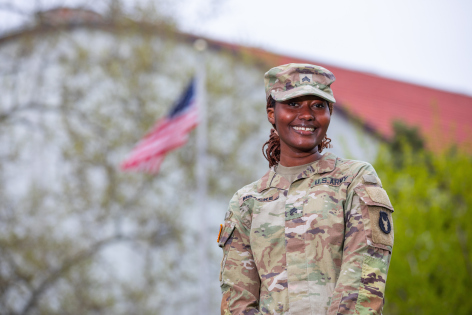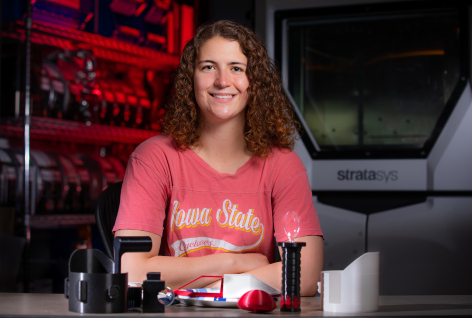AMES, Iowa – Born in Philadelphia. Raised in Senegal. A short stint in New York City. And a National Guard deployment in Kosovo.
Toss in a few years studying in Ames at Iowa State University, and it seems like Khadija Mbacke has been everywhere and done it all. At the conclusion of this semester, Mbacke will be able to add college graduate to her long list of accomplishments and experiences.
She’s managed to complete degrees in agronomy and horticulture by leaning on her ability to adapt to new environments, but she also said she couldn’t have done it alone. The community and resources she found at Iowa State helped her get here.
Mbacke will take the knowledge and skills she’s developed at Iowa State onto the next phase of her academic journey, with a dream to return to Senegal to develop the country’s capacity for raising vegetables in greenhouses.
Around the world by 17
Mbacke was born in Philadelphia but returned to Senegal in western Africa at age six. Her parents are both Senegalese, and Khadija spent her childhood there. Her father tended farms, and her mother took care of plants and trees in their yard as a hobby in addition to her job as a social worker. Those early memories instilled in Mbacke a love for agriculture and plants of all kinds.
She finished high school at 17 and returned to the United States in 2019 with the dream of going to college, but she didn’t have the financial means to start right away. She lived in New York City, where she worked two jobs and shared an apartment with three other people.
“I was trying to decide where I wanted to go and study for college. How am I going to pay for college?” she said while recalling the challenges she faced in New York. “I didn’t really have a lot of support. A lot of people around me didn’t go to college, so it was hard figuring out how to navigate that. The workload that I had to do and stress of paying for it all, I knew I needed to go somewhere else with a more sustainable lifestyle.”
She considered going to a community college in New York, but it became apparent the cost of living was simply too high. So she looked at options in the Midwest and applied to three schools. A cousin from Washington, D.C., had enrolled at Iowa State, and he was thriving. That convinced her to become a Cyclone.

Khadija Mbacke, graduating with degrees in agronomy and horticulture, grew up in Senegal and spent time in New York before enrolling at Iowa State. She joined the National Guard to help pay for college and was deployed to Kosovo. (Christopher Gannon/Iowa State University) Larger image. |
Adapting to college
Mbacke enrolled at Iowa State in 2020 to study agronomy and horticulture, disciplines that attracted her due to her childhood fascination with plants and agriculture. Moving to the Midwest posed some challenges, including no small amount of culture shock, she said. While taking a soils class early in her time on campus, Mbacke discovered the Corn Belt soils that most of her classmates knew so well differed drastically with the soils she grew up with in Senegal.
So she did what came naturally to her and adapted to her new situation.
Mbacke learned to get comfortable asking questions and making use of the resources available at Iowa State to make a successful transition into higher education. ISU faculty proved welcoming and helpful. Mbacke also was able to get involved with the Women in Agronomy Club, an organization composed of ISU students, staff, faculty and professionals. The group met biweekly to discuss agronomy-related topics and often featured industry speakers. For Mbacke, the club was a chance to network and a place to belong.
But questions still surrounded how she would finance her education. The money she’d saved while working in New York quickly ran out.
She decided to join the National Guard, which led to a deployment in Kosovo in December of 2020. Mbacke spent seven months as a human resources specialist, tracking personnel and handling documentation regarding promotions and other functions. She took online courses while deployed, and the experience did not delay her graduation at all.
“It was a way I could serve my country and at the same time get my school paid for and improve my physical fitness,” Mbacke said. “And it was just a good experience for me to have.”
In August 2021, Mbacke began working in the laboratory of Marshall McDaniel, associate professor of agronomy, studying the relationships between plants and soil. She conducted research on incorporating chickens into organic vegetable production, studying the potential benefits to soil nutrients of letting chicken flocks onto fields. The research required Mbacke to collect soil samples from the ISU Horticulture Farm to analyze alongside soil samples taken at the University of California, Davis, and the University of Kentucky.
Mbacke was accepted into the Ronald E. McNair Postbaccalaureate Achievement Program, which prepares undergraduates from underrepresented segments of society for graduate school. All that research and studying paid off when Mbacke was accepted into a master’s program at Purdue where she’ll study vegetable production in controlled environments like greenhouses.
She wants to earn a Ph.D. and eventually return to Senegal to apply what she’s learned to improve the resilience of agricultural systems in the country where she spent her childhood and where her father still farms.
She credits the unfailing belief of her parents and other family members, as well as the support of faculty and the community she found at Iowa State, for helping her achieve her dream of earning a college degree.
“I went through a lot of challenges that I thought I wouldn’t be able to manage, but I had a lot of people supporting me … I think connection is the biggest thing, and support,” she said.
Contacts
Khadija Mbacke, Agronomy and Horticulture, smbacke@iastate.edu
Fred Love, News Service, 515-294-0704, fredlove@iastate.edu
Quick look
From Senegal to Kosovo to Ames, it seems like Khadija Mbacke has been everywhere and done it all. At the conclusion of this semester, Mbacke will be able to add college graduate to her long list of accomplishments and experiences. Resources she discovered at Iowa State helped her get here.
Quote
“I went through a lot of challenges that I thought I wouldn’t be able to manage, but I had a lot of people supporting me … I think connection is the biggest thing, and support.”
Khadija Mbacke, grduating senior in agronomy and horticulture
Quinton's story
Cassie's story
Cassie Swacker’s quest to help others through engineering began while she was in high school, when she saw how a prosthetic leg changed her father’s life. She’ll graduate at the end of this semester, and her engineering quest will continue as she begins a career developing innovative solutions in technology and manufacturing. Read Cassie's story.
Commencement information
Nearly 4,600 students are expected to complete degrees this spring. That includes an estimated 3,866 undergraduate students, 575 graduate students and 157 veterinary medicine candidates. Iowa State will hold five commencement ceremonies. Full commencement information.
More news
Find more Iowa State University news and research stories at news.iastate.edu.
